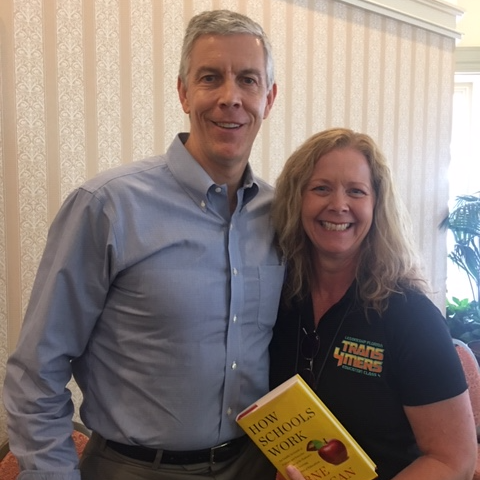Owning Responsibilities of Leadership
Guest Correspondence
SRQ DAILY
SATURDAY JUL 6, 2019 |
BY JENNIFER VIGNE
Photo courtesy Education Foundation: Jennifer Vigne with former U.S. Secretary of Education Arne Duncan, a speaker at the Leadership Florida Conference.
Going to a conference is an experience that can be embraced or endured.
Busy people everywhere can relate to the questions: Is it worth taking time away from my family and office? What can I gain from this conference that I can internalize and share with colleagues?
Having just returned from the Leadership Florida annual conference, my answers are an emphatic “YES” to the first question and “A LOT” to the second.
As a member of the 2018 Leadership Florida Education Class, it was my first statewide annual Leadership Florida conference.
I expected a lineup of luminaries as speakers. What was unexpected was the incredible impact of the speakers’ life experiences and lessons they shared about the meaning of leadership.
More than clever nuggets, their words were meaty food for thought. Presented earnestly, they resonated, challenged and planted seeds in my mind.
In the spirit of sharing, I offer key points from speakers who made the deepest impressions.
Bryan Stevenson, founder of The Equal Justice Initiative and author of “Just Mercy.” By his actions, Stevenson models points that he reiterated for us as leaders to help change the world.
· Get proximate. Until you walk in the shoes of another person, you can’t fully understand that person’s actions, motives or views. I recognized this definition of proximate as it applied to my recent immersive visit to Israel and the effect it had on altering my own perspective.
· Change the narrative. Leaders must draw upon courage to change the narrative. Currently we operate in the politics of fear and anger--the ingredients of oppression--and we lean on false ideologies to help us reconcile immorality. As leaders, we should journey to higher ground and be willing to help those who need us most. That truth begets reconciliation.
· Stay hopeful. Hope is critical to the capacity to change.
· Commit to doing things that are uncomfortable and inconvenient if we want to change the world.
Brad Meltzer, best-selling author and board member of the National Medal of Honor Museum Foundation. In talking about medals of honor and leadership, Meltzer shared his view that leadership is not just being in charge; rather, it’s taking care of those who are in your charge.
“Show me your heroes and I’ll show you who you are.” Meltzer’s provocative comments challenged us as leaders to consider our own medals of honor such as courage, bravery, decency and humility while reflecting on what it took to earn them. Those traits are the key ingredients that we need in our leaders.
Liz Murray, whose personal story was depicted in the “Homeless to Harvard” film and her memoir, “Breaking Night.” Murray’s presentation was incredibly moving as she spoke with raw authenticity about her life’s journey living on the streets before being admitted to Harvard University. We were a large audience in a big room but Murray’s vulnerability made it seem we were having an intimate conversation.
Murray shared some gems about what she has learned along the way to becoming a person who is widely admired.
· You need to love the human and correct the behavior.
· People will grow into the conversation you have around and with them.
· Possibility is found in action.
· Cynicism is the atrophy of imagination and atrophy of the heart.
· No one is coming! If you’re going to effect change, you have to be the one.
Ruby Payne, educator and author of “A Framework for Understanding Poverty.” It’s daunting to attempt wrapping one’s arms around the topic of poverty. Payne provides a framework to understand differences in circles of connections, achievements and relationships to examine where the circles overlap and separate. When differences aren’t fully understood, well-intentioned efforts often fail. An example is when people of wealth sincerely try to solve problems of poverty without first understanding what poverty really is or asking those in poverty how they would solve the problem. Payne brought the concept home when pointing out how different circles spend time. Equity of time is one thing common to everyone in all circles but the distribution of how time is spent differs widely. People in poverty view 24 hours in terms of surviving whereas people who aren’t in poverty think about what they can achieve in the same 24 hours.
The speakers’ inspiring messages motivated us, as leaders, to own the incumbent responsibility to take action and not tuck away these concepts to validate ourselves.
If we really want to effect change for good, even when we feel like we’re pushing the ball uphill, the task ahead is choosing how we will move forward and what we will do from here. I believe we are equal to the task.
Jennifer Vigne is president of the Education Foundation of Sarasota County
Photo courtesy Education Foundation: Jennifer Vigne with former U.S. Secretary of Education Arne Duncan, a speaker at the Leadership Florida Conference.
« View The Saturday Jul 6, 2019 SRQ Daily Edition
« Back To SRQ Daily Archive









